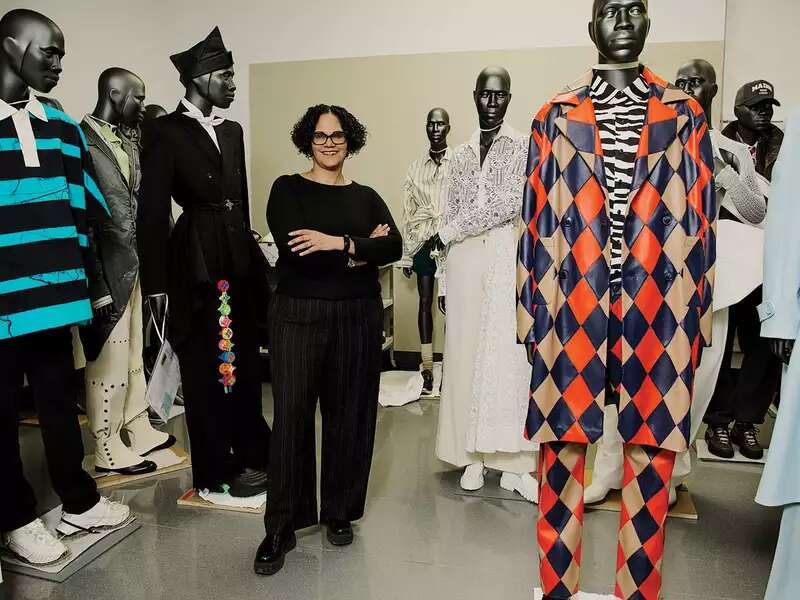
The Barnard professor brings her research on Black dandyism to the Met Costume Institute

When she was a little girl growing up in Cleveland, Ohio, Tara Well got an early glimpse of her future by peering at a toaster. The shiny chrome surface was a first mirror, and her fascination with her reflection was a sign of big things to come. She would become an acclaimed personality psychologist with a particular focus on self-reflection. Her latest book, Mirror Meditation: The Power of Neuroscience and Self-Reflection to Overcome Self-Criticism, Gain Confidence, and See Yourself With Compassion, speaks to the power of facing yourself in the mirror.
Since its release in June 2022, the book has helped to further elevate the media profile of the Barnard associate professor of psychology. Well has a blog with 2 million readers and a TEDx talk with nearly 200,000 views, and she appeared on The Daily Show With Trevor Noah last year in a mock-documentary-style segment on the importance of small talk.
“It was fun. I mean, I knew I was just going to be the straight woman for that,” says Well. She also presented her observations on the importance of small talk and how the pandemic has eroded society’s social skills at a Barnard College staff event in February, part of a series called Pro Tip.
Why the focus on small talk? As Well explained it, talking with others, face-to-face, is another important reflective experience: “Being reflected occurs naturally during face-to-face conversations. We need these reflections from others to affirm our sense of self, help us regulate our emotions, and be in social coordination with others.” In the book, Well demonstrates how facing ourselves in actual mirrors is a powerful way to better know and accept ourselves.
The impetus to include mirror work in her studies started with a serendipitous moment — a glance at her own reflection. She was taken aback by what she found: sorrow.
“I was looking really sad and kind of distressed,” she says. “I hadn’t realized I felt that way. So I started to meditate with a mirror mainly to help me get more in touch with my emotions because I felt that there was a gap between what I was feeling inside and what was showing on my face. The impact was powerful. I decided to do some mirror-gazing experiments where I had other people do it and report to me what they discovered.”
Many of Well’s research subjects discovered deeper levels of self-awareness, and from that came self-compassion. Looking at your own face when your self-talk is negative, or even cruel, can spark a realization of the pain you’re inflicting on yourself.
Why are we so self-critical? In her book, Well explains that “negativity is an attention magnet.” The human mind is hard-wired to look for problems because we need to devote more attention and cognitive resources to potential problems. Our minds are predisposed to look for problems because they can indicate threats and possible danger.
“Due to a combination of evolution and socialization, our criticisms of the image we see in the mirror usually pertain to the three main topics: old, fat, ugly,” she writes. In a society that celebrates young, slender beauty, these assessments can cut deeply and distort self-perception. Well’s approach — facing one’s worst critic in the mirror — seeks to heal the psychological wound and foster self-kindness and self-knowledge.
Well’s path from her childhood home in Cleveland to Barnard was very much a work of claiming her identity despite external perceptions. As the adopted child of parents who did not attend college, she ran up against limiting expectations.
“I didn’t know places like Barnard even existed, frankly. I grew up being told that I wasn’t smart enough to go to college and I should go ahead and get a job while learning some kind of skill, like being a hairdresser or working in a hospitality field. Going to college and then continuing on and getting a Ph.D. was like an act of rebellion against my roots,” says Well.
She became fascinated with psychology and was driven to learn more and more, which led her to the study of personality. But in a twist of fate, self-discovery, and scientific insight, she later went on to find her birth parents. Turns out, they were both college professors. Her birth father, now retired, was a psychology professor. Her own journey closely paralleled the professional lives of her biological parents.
“It’s interesting because I saw so many similarities,” she says. “I’ve been studying and teaching personality psychology at Barnard for the past 25 years. And one of the core questions is always looking at the contribution of environmental factors and learning factors and how they shape personality and then genetic factors and how they shape personality too. So it was a very interesting experiment.”
Well urges her students, readers, and listeners to conduct their own experiments, and she outlines specific steps to forming a mirror meditation practice to confront and heal self-criticism, selfie and social media addictions, and anxiety.
“I believe the mirror is one of the most valuable tools we have today,” Well says near the close of her TEDx talk. “Taking a few minutes to gaze into your own eyes can calm you and awaken your kindness. Imagine what the world would be like if we took the time to see ourselves and each other with unwavering clarity and compassion.”
Illustration by Joe Anderson